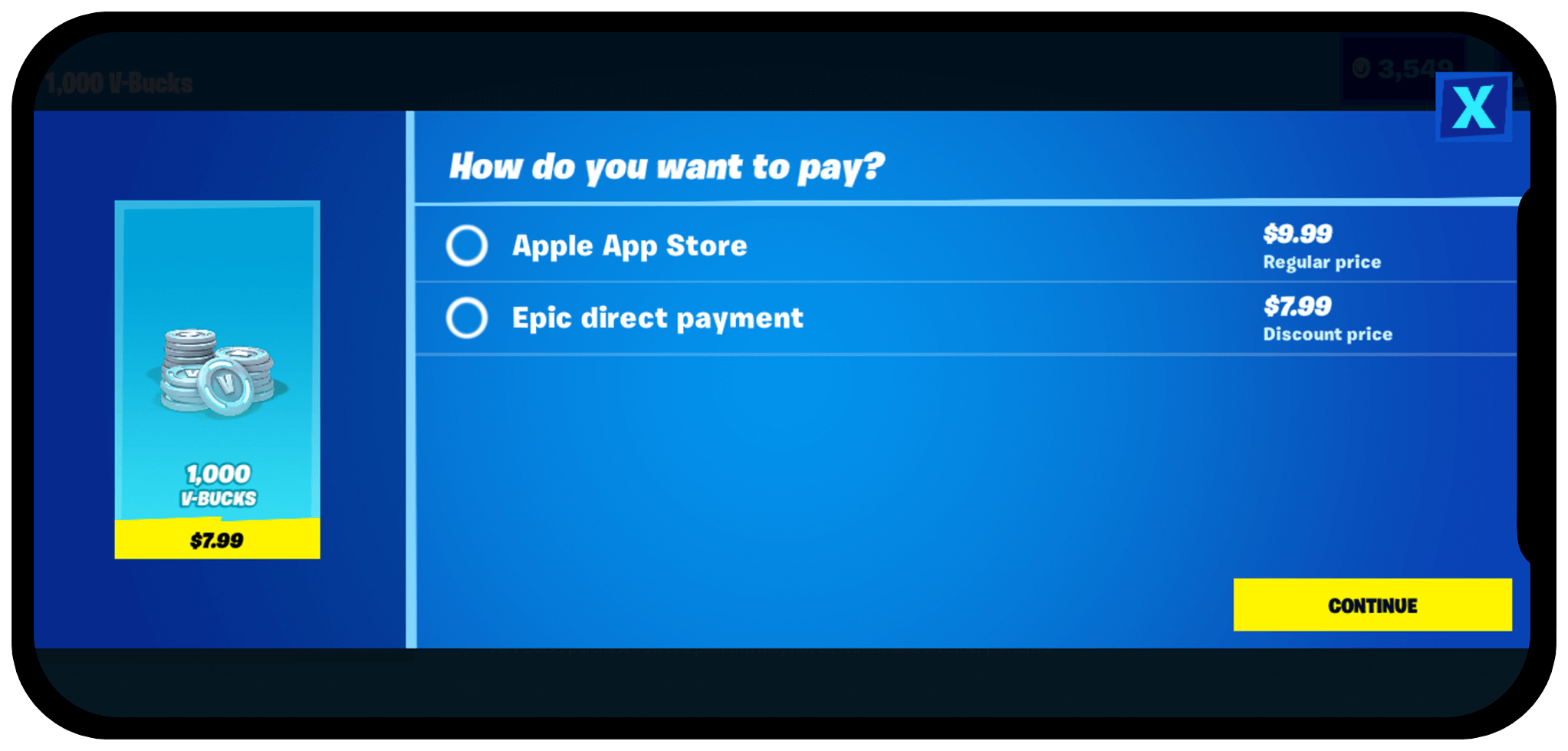Everyone is mad about Apple’s App Store guidelines right now, especially when it comes to cloud gaming services. Microsoft isn’t bringing Project xCloud to iOS. Google’s Stadia app can’t let iPhone users actually play games. Facebook also had to axe the ability to play games for its Facebook Gaming iOS app to be allowed in the App Store. And that doesn’t even take into account the number of smaller, non-gaming app developers who have had their apps kicked out of the App Store after seemingly arbitrary enforcement of Apple’s guidelines. But Fortnite developer Epic Games took a bold step toward telling Apple what it thinks of the company’s App Store policies, possibly attempting a loophole to get around things. Fortnite has now been kicked out of the App Store. And Epic is suing.
Yesterday, Epic Games introduced the ability to pay the company directly for V-Bucks in the Fortnite app on the App Store and in Google Play store for Android, bypassing the in-app payment methods in both apps. On top of that, Epic Games is giving users a 20% discount for using the direct payment method. According to Apple, in a statement to the Verge, this is in violation of App Store guidelines, which states that apps offering in-game currency for real money cannot use a direct payment method.
3.1.1 In-App Purchase:
If you want to unlock features or functionality within your app, (by way of example: subscriptions, in-game currencies, game levels, access to premium content, or unlocking a full version), you must use in-app purchase. Apps may not use their own mechanisms to unlock content or functionality, such as licence keys, augmented reality markers, QR codes, etc. Apps and their metadata may not include buttons, external links, or other calls to action that direct customers to purchasing mechanisms other than in-app purchase.
Before removal, a screenshot of the Fornite app on iOS clearly showed that users have the option to either purchase V-bucks through the App Store or send a direct payment to Epic Games.
“Today, we’re also introducing a new way to pay on iOS and Android: Epic direct payment. When you choose to use Epic direct payments, you save up to 20% as Epic passes along payment processing savings to you,” Epic Games announced in a press release this morning.

Google’s policies also seem to prevent developers from using anything but an in-app payment system.
In-app purchases:
Developers offering products within a game downloaded on Google Play or providing access to game content must use Google Play In-app Billing as the method of payment.
Epic Games pointed out that both Apple and Google collect a 30% fee, and that if users choose to pay through either store’s app they will not benefit from the 20% discount — hence the lower price on the direct payment option.
“If Apple or Google lower their fees on payments in the future, Epic will pass along the savings to you.”
Damn, Epic. Shots fired.
Apple swiftly responded, providing a statement to The Verge (bolded is our added emphasis):
Today, Epic Games took the unfortunate step of violating the App Store guidelines that are applied equally to every developer and designed to keep the store safe for our users. As a result their Fortnite app has been removed from the store. Epic enabled a feature in its app which was not reviewed or approved by Apple, and they did so with the express intent of violating the App Store guidelines regarding in-app payments that apply to every developer who sells digital goods or services.
Epic has had apps on the App Store for a decade, and have benefited from the App Store ecosystem – including its tools, testing, and distribution that Apple provides to all developers. Epic agreed to the App Store terms and guidelines freely and we’re glad they’ve built such a successful business on the App Store. The fact that their business interests now lead them to push for a special arrangement does not change the fact that these guidelines create a level playing field for all developers and make the store safe for all users. We will make every effort to work with Epic to resolve these violations so they can return Fortnite to the App Store.
[referenced id=”1239031″ url=”https://gizmodo.com.au/2020/08/apples-understanding-of-games-is-so-narrow-its-screwing-itself/” thumb=”https://gizmodo.com.au/wp-content/uploads/2020/08/12/ymolbgfikvffrwudxtjb-300×169.jpg” title=”Apple’s Understanding of Games Is So Narrow It’s Screwing Itself” excerpt=”When most people think of Apple, video games aren’t the first thing to come to mind. Photo- or video-editing, of course, or some other type of creative work, but not gaming. That’s because of the way Apple designs and markets its products.”]
The problem for Apple is that both it and Google have policies related to purchases that are consumed outside of their respective app stores. Both allow users to make payments outside of the app.
Apple’s policy:
3.1.5(a) Goods and Services Outside of the App: If your app enables people to purchase goods or services that will be consumed outside of the app, you must use purchase methods other than in-app purchase to collect those payments, such as Apple Pay or traditional credit card entry.
Google’s policy:
Developers offering products within another category of app downloaded on Google Play must use Google Play In-app Billing as the method of payment, except for the following cases:
Payment is solely for physical products
Payment is for digital content that may be consumed outside of the app itself (e.g. songs that can be played on other music players).
In-app virtual currencies must only be used within the app or game title for which they were purchased.
Fortnite is available on multiple platforms: PC, Mac, Xbox, PlayStation, Nintendo Switch, Android, and iOS, and users can link their profiles together so they can play with the same account across all platforms. This means that someone could purchase V-Bucks through the Android and iOS apps and spend them at a later date from their console or PC. So technically those users appear to be purchasing “goods or services” that can be consumed outside of the app.
That explain why users can, for instance, purchase books through Amazon’s Kindle app on Google Play without having to go through Google Play In-app Billing. Those books can be read on a Kindle device, and they’re digital content, so that means they can be “consumed outside of the app itself.” Google Stadia on the App Store is another example, since it doesn’t require an in-app payment method. Apple doesn’t allow users to play Stadia games on iOS, so they have to play, or “consume” games outside of the app.
It seems like Apple may have just violated its own guidelines that allow users to pay for goods to be consumed outside of the app by removing Fortnite from its store, but we’re guessing Apple doesn’t care. We’re also waiting to see if Google will follow Apple’s lead and remove Fortnite from Google Play.
We’ve reached out to Apple, Google, and Epic Games for comment and will report back as soon as we learn more. If you have any inside knowledge about Epic Games’ strategy with this move, or if you’re a developer who has had a similar experience dealing with the Google Play or Apple App Store teams, email me at jnelius@gizmodo.com or joannanelius@protonmail.com, or contact us anonymously via SecureDrop.
Update 5:57am — In a statement provided to Gizmodo Epic Games has noted it has filed suit against Apple. Bolded emphasis is Epic Games.
Today, Epic announced the Fortnite Mega Drop. The Fortnite Mega Drop is an up to 20% price reduction on all V-Bucks and real-money offers inside of Fortnite when using select payment methods. On mobile, we’ve introduced a new way to pay on iOS and Android: Epic direct payment. When players choose to use Epic direct payments, they save up to 20%.
Apple has blocked access to Fortnite on iOS devices. Epic has taken legal action to end Apple’s anti-competitive restrictions on mobile device marketplaces. The papers are available to read here.
From the legal filing:
“Rather than tolerate this healthy competition and compete on the merits of its offering, Apple responded by removing Fortnite from sale on the App Store, which means that new users cannot download the app, and users who have already downloaded prior versions of the app from the App Store cannot update it to the latest version. This also means that Fortnite players who downloaded their app from the App Store will not receive updates to Fortnite through the App Store, either automatically or by searching the App Store for the update. Apple’s removal of Fortnite is yet another example of Apple flexing its enormous power in order to impose unreasonable restraints and unlawfully maintain its 100% monopoly over the iOS In-App Payment Processing Market.”
